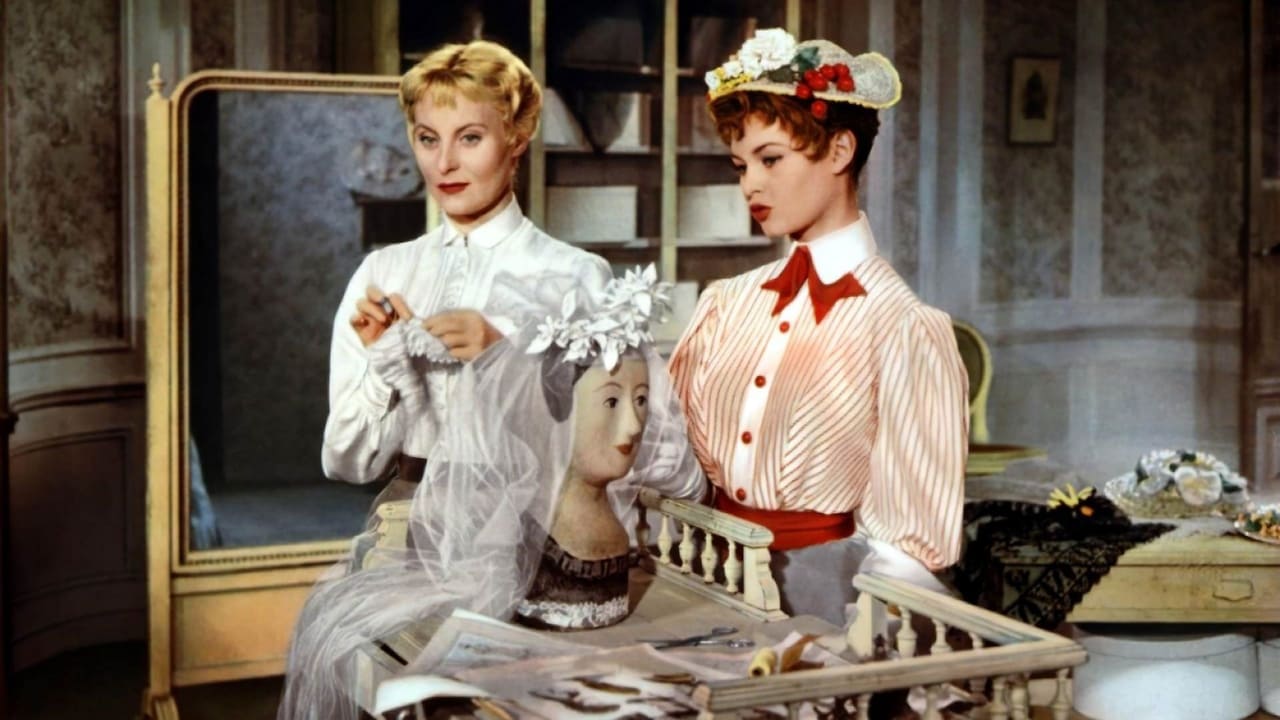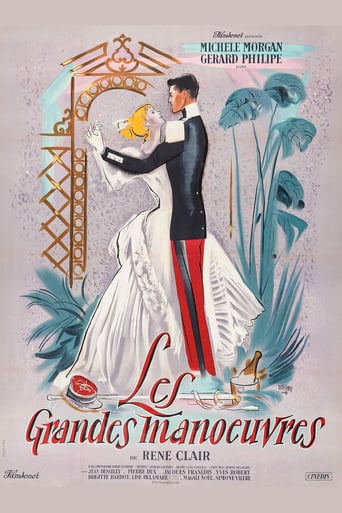

Excellent, Without a doubt!!
... View MoreDreadfully Boring
... View MoreActress is magnificent and exudes a hypnotic screen presence in this affecting drama.
... View MoreThe plot isn't so bad, but the pace of storytelling is too slow which makes people bored. Certain moments are so obvious and unnecessary for the main plot. I would've fast-forwarded those moments if it was an online streaming. The ending looks like implying a sequel, not sure if this movie will get one
... View MoreI admit, I was not very big in this film for the most part of it. But hey, is very good from a visual standpoint. We have very unexpected angles and a weird set of lights. Look at how messy the lights are in this film. It helps even more to put focus in the characters. In fact, it alone put a focus in the characters, because they become darken than the set's natural light. And the plot is kinda ugh, you know what I mean? Very cliché. Sure, back in 1955, this kind of 'Guy wants to date girl because of bet with friend" must have been interesting and very original, but nowadays? Not very much, if you ask me. Maybe this is the film that started all these clichés? Well, I don't know, further research is welcomed. But anyway, the editing, the transition of scenes is very crazy, and certainly a very good technique aesthetically talking. This technique alone can change completely the film's ambient.Is kinda interesting and even funny at times, but yeah, for the most part there is nothing that you already haven't seen before made much better than in this film.
... View MoreIs it possible to hurt those who are incorrigibly superficial? Probably. In René Clair's Les Grandes Manoeuvres, an amusing film of manners, morals and seduction, you can watch how to do it in style. Lieutenant Armand de la Verne (Gerard Philipe) is a dashing young officer of the 33rd Dragoons. His regiment is based in a small provincial French town. The time is well before World War I. de la Verne has a reputation of having seduced just about every daughter, wife and mistress among the town's grande bourgeoisie and petit nobility, not to mention their maids and a number of night club singers. He's charming, confident, light-hearted and may even mean some of those endearments and pledges he whispers, at least when he's whispering them. His regiment will be going on maneuvers in 30 days, and a wager is placed between his friends in the regiment and their civilian friends. A woman will be chosen at random, and if Armand has not seduced her before the regiment leaves, he and his friends will pay for a sumptuous farewell dinner. If he succeeds, their friends will pay. Armand is supremely confident. So are his friends. The woman turns out to be Marie-Louise Riviere (Michelle Morgan), single, divorced and the proprietor of a millinery shop. The women of the town have been polite toward her but suspicious. She is, after all, an outsider and divorced. A reputation can be extraordinarily fragile when upper-class gossips start whispering together. Not only does Lt. de la Verne begin finding reasons to be gallant toward Madame Riviere, so does Victor Duverger (Jean Desailly), a cautious citizen of the town who is just as worried about his own reputation. He has two sisters who don't approve. Marie-Louise has no wish to see her reputation ruined, despite all those who are observing and who love to have something to talk about behind their fans. Then, to Armand's befuddlement, in the process of seduction he begins to fall in love. By then, everyone is aware of his attempts with Marie- Louise, and all his well-worn (and previously successful lines) are repeated with laughter by his friends, by the women he has seduced and in some cases even by those he didn't. Marie- Louise hears the whispers...even worse, she learns of the wager. This movie which is so stylish, which glows and smiles with such elegant artificiality, has a decidedly ironic ending. The movie is permeated with a gorgeous sense of unreality. The costumes and colors are vibrant; the scenes in the town streets, the drawing rooms, the ball rooms are almost like exquisite drawings. The officers strut along in their red pants, polished black boots and stiff collars. It's apparent that to be a success as an officer one must dance well. Michelle Morgan is a vision with her long neck, blond hair and enigmatic eyes. Gerard Philipe, however, is the center of the story. He's a seducer, a happy comrade, a man who loves a challenge in love and is unafraid of a challenge for a duel. He is so completely superficial that his growing acquaintance with love and his final look at a pair of closed shutters is touching. Gerard Philipe was one of France's greatest actors and leading men in the Fifties. He was 33 when he made this film. He was dead four years later. He said he was feeling poorly and went to his doctors for a check up. They discovered he had cancer of the liver. He died weeks later at the age of 37. And for those whose pulse may not quicken at the thought of watching a foreign language film, remember that René Clair worked in Hollywood during WWII (and was stripped of his French citizenship by the Vichy government). Look for I Married a Witch, It Happened Here and And Then There Were None.
... View MoreA French army regiment, resplendent in colorful uniform, is quartered in a French provincial town for summer exercises. As this detachment first enters the town marching in order down its main thoroughfare, a beautiful woman (Michele Morgan) appears on the balcony of her fashion shop and catches the eye of the regiment's dashing and handsome Lothario who has already compiled a notorious string of conquests (Gerard Philipe). This gives rise to a bet by his fellow soldiers with him, when the soldiers reach their barracks, that this time he will not be able to seduce this woman. He launches a spirited campaign for her, designed to sweep her off her feet, but becomes so ensnared in her charms that he completely loses his mind and falls genuinely and madly in love with her, forgetting totally about the bet and wanting only her. The high point of his fortunes is reached when, practically on bended knee, he protests to her that he does not love her for only a few days or a few weeks but for his whole life. She is on the point of yielding to his entreaties when she learns of the bet. The denouement is exquisite torture as she is unable to credit his protestations any longer notwithstanding that she passionately desires to, he is in effect impaled to his hurt on the thorns of his past, she ends by returning to the fat husband with greasy ringlets of curls from whom she'd been divorced and who appears totally unworthy of her, and the regiment marches out of town at the end of summer. There are comic interludes of great charm and even some hilarity, as well as all the brilliance and wit that make a French movie a French movie, but all in all this is a sentimentalist's dream of a production in which the adorable loveliness of Michele Morgan is at its dazzling height.
... View MoreThis is one of the most finely crafted films of cinema's short history. Period atmosphere, costumes, sets, indoor and outdoor photography, pacing and editing are all superb. The music by Georges Van Parys is poignantly nostalgic and at the same time entertaining and light. The biggest attraction of this film, though, is the wit of its script, which could rival any comedy of Shaw or Wilde or Colette, and top them all for sheer virtuosity in the art of depicting the many faces of love, and its delivery by one of film history's most finely cast troupe of comedians. `Les Grandes Manoeuvres' is ostensibly a Gérard Philipe vehicle, full of his inimitable monologues, which lets Michèle Morgan do what she does best: suffer coldly, remotely, nobly, silently and elegantly. It is peopled by actors the likes of which this planet has rarely seen brought together, namely Jacqueline Maillan and Lise Delamare as Jean Desailly's wicked, two-faced, possessive sisters who marry the feline elegance of beasts of prey with the evil but colourful personality of Walt Disney's Cinderella's wicked stepmother. It features some of the most beautiful women of the planet: Morgan, Bardot, Dany Carrel, Magali Noël. The men are also physically and mentally highly idealized. This film is rarely shown and therefore largely unappreciated. It is only available on DVD in a pristine transfer in French only on a Brigitte Bardot boxset from Quebec (imavision.com) comprising seven films of various worth ranging from this unqualified masterpiece to more lowly efforts to Fellini-Malle-Vadim's `Histoires extraordinaires'. This film is so good it is probably worth learning French to understand all its subtleties and absorb its unique charm. It makes all of René Clair's preceding efforts, even the most poetically imaginative like `Beauties of the Night', look like immature doodles or preliminary sketches.
... View More